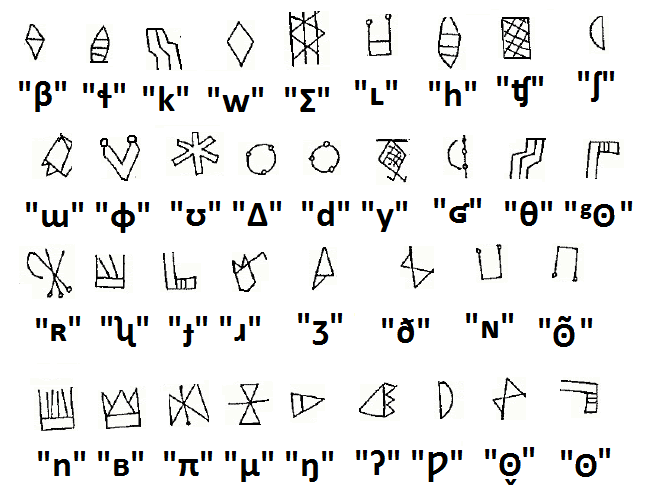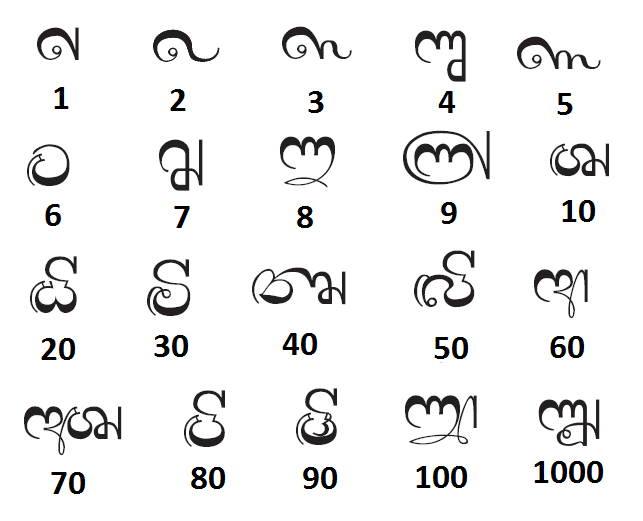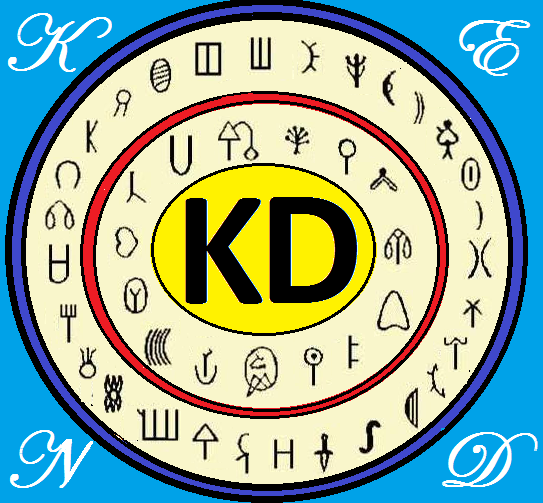Sitting in a pub on a cold day and eating a nice thick steak, I heard a nearby Threrken make a thick guttural sound akin to choking. I patted the creature on the back and asked it if it was alright, to which the Threrken responded "I was just asking my friend here to pass the salt."
Öl (pronounced as "Uwl" in the language) is a primitive language spoken by the
Canids. Said to have originated from Threrkens learning a few words of Oldspeak and adding their own words to it, the language is unique for its odd sounds and lack of proper vowels. The language is spoken by Threrkens only, as any other person will not be able to mimic the required sounds. It is said that spoken Öl sounds like a horse with a throat-problem.
Writing System
The language of Öl is written with the Aku'Aku script, a script said to have been imported from another dimension a few centuries before. The script has 35 letters: "β" (pronounced as "V"), "ɬ" (pronounced as "LL"), "k" (pronounced as "χ"), "w" (pronounced as "ɰʷ"), "Ʃ" (pronounced as "SS"), "ʟ" (pronounced as "ɮ"), "h" (pronounced as "Ħ"), "ʧ" (pronounced as "ch"), "ʃ" (pronounced as "ʐ"), "ɯ" (pronounced as "MM"), "ɸ" (pronounced as "Ph"), "ʊ" (pronounced as "ə"), "Δ" (pronounced as "DD"), "d" (pronounced as "ɖ͡ʐ"), "y" (pronounced as "ʉɨ"), "ʛ" (pronounced as "gg"), "θ" (pronounced as "tl"), "ʀ" (pronounced as "ʁ"), "ʯ" (pronounced as "Q"), "ɟ" (pronounced as "dʒ/ɣ"), "ɹ" (pronounced as "ɾ"), "ʒ" (pronounced as "ç"), "ð" (pronounced as "TT"), "ɴ" (pronounced as "NN"), "n" (pronounced as "ɳ"), "ʙ" (pronounced as "r̼/pʰ"), "π" (pronounced as "pʷ/ff"), "µ" (pronounced as "ntt"), "ŋ" (pronounced as "ngg"), "ʔ" (a clicking sound, pronounced as a glottal stop), "ʘ" (a bilabial click, appearing at the end of words), "ʘ̃" (a nasal click), "ʘ̬" (a voiced click) "ᶢʘ" (a rear-voiced click) and "Ƿ" (pronounced as "wn/wm").

by C.S.De Silva (Ken D)
Punctuation Marks
The "¡" punctuation-mark represents a rise in pitch and sound, and normally appears before a word to indicate a change in tone. The "෴" symbol is used to mark a rise and descent in tone, to represent finality; it appears normally at the end of certain words as a fullstop. The "" mark symbolizes a change in timbre and represents a word ending and a new word beginning, and normally appears at the end of a word. The "﴾" and "﴿" symbols appear before and after speech-marks, and represent a rise and descent in volume: "﴾" is a rise in volume whilst "﴿" is a softening in volume. The "۞" symbol marks the beginning of a sentence and the "¿" symbol is a question-mark (?). A comma is indicated by the "؏" mark and the "ϡ" mark is an exclamation-point (!).
Numerals
The language also makes use of a numerical-system rare to it:

by C.S.De Silva (Ken D)
This numerical-system does not have a sign zero and does not have zero concept holder. The numbers are curlicues with separate symbols for 1, 2, 3, 4, 5, 6, 7, 8, 9, 10, 20, 30, 40, 50, 60, 70, 80, 90, 100 and 1000. To represent zero or a null value, the symbol for "1" is sometimes marked with a cross.
Orthography is case-sensitive, that is upper and lower case letters are not interchangeable (uppercase letters mostly represent sounds different from those expected). E.g. the "D" sound is different from the "d" sound. "D" is thicker than "d" and is said from the back of the throat. There is no distinction between capital and lowercase letters. Sentences can start with lowercase letters or end with uppercase letters. It all depends on the sound.
Öl is an agglutinative language, using mainly affixes in order to alter the function or meaning of words. Nasal sounds may appear in front of words, and the clicking noise is repeatedly used. Vowels (except for "ʊ" and "y") are nonexistent. Instead, words are mostly consonant-clusters.
The language is thick with its vocabulary. Words are stacked with each other in random orders. There is no proper structure at all.
Sample sentences:
"﴾۞¡Ʃʔʒnkwnʘ̃yʘ kwʟʘ ʃΔɟʊʔʒʘ¿﴿"
("Do you like me?")
"﴾۞¡ŋʔwʛʛyᶢʘʔɟdʊʔʘ﴿෴"
("I don’t understand.")
"﴾۞¡ŋʘ̬ƩʃΔwkʘ̃yᶢʘʔʊʔ ʒʔŋʟƩwʔʟwɬʙʘ̃ʔʘ﴿෴"
("I can’t eat that thing.")
"﴾۞¡ŋʔdΔʔʟʘ̃ʔʊʧwʘ̬wʔʘ﴿෴"
("You are wrong.")
"﴾۞¡ŋɴʔdɟʔɹʒʔƩ bʔʟʔɹ ʛʊʟʟʘ̃wʔΔʟʔ ɹʊʯ ŋʔʊʘ̃ɴʔwʔ ɹɟyʔʘ﴿෴"
("Revenge is the purest form of rage.")
"﴾۞¡ŋʔʯʊʘ̃kʒwɬǷʊɯʘ ʟʯwʯʘ ɟʔʊʔɟwǷʘ̃ɯʘ﴿෴"
("Every day you're alive is a good day.")
Curses/Slang/Swearing
"﴾۞¡ɟʟʟʘ Ƿɯʊʯʘ hɬβʛʛwʊʔɟʘ jʊʧʯwɯǷɯʟɟʘ̃yʘ﴿෴"
("May your daughter have an ugly child.")
"﴾۞¡ʒʊʔʊʔʘ nʊΔʘ nᶢʘwnΔwβʙʘ ŋʔʊʔʘ ʒʔwʘ﴿෴"
("The fool is the first to place blame.")
"﴾۞¡ŋθʟhʧʧʘ ŋʔʧƩʘ̃yʘ ŋʔɬwʘ dΔʯwʯwɬʔʘ ʃƩwʔʘ dΔwʒʘ﴿෴"
("Your mother should have crushed you skull when you came out.")
"﴾۞¡ɹwɯǷβɸɬwƩɹkwʀʔʙʘ nʯwʒʘ ʒʔyɹʟɸwʒʘ؏ ʃɸʯʊʔƩwβʔʘ ʃΔʯ ʒʔhʟʟɟʘ﴿ϡϡϡ"
("Crawl back to the hole you came from, you miserable wretch!!!")
"﴾۞¡ŋβʊβwɬʔʘ ʃʯwwʔʘ ʃƩʊyʔǷwʯɯʊʯʘ ʯʊʛ ʒʯʘ ɟɬɬwʔhwʧʘ؏ ɹʔɟ µµʘ̃ʯʘ wɬʊɯǷwʯʘ﴿෴"
("If I used spit to clean your ugly face, I would only dirty the spit.")
"﴾۞¡ǷwʔΔɟwβʘ ʃɸɸwʟʛΔwʯᶢʘyʘ ɟʊᶢʘyʘ ʙwrʧɸʔʘ ŋʯʊfnʃɸwʔdwʧʘ ʃƩɟɬɬʊɟʘ﴿෴"
("I pity the fool who blames the sky for rain or the sun for shining.")
"﴾۞¡ʃɸɟʙɸwjʯʯʊʔyᶢʘʔɬɬɟǷɯwʘ dΔwʒʘ؏ ʃdΔwƩwɸʯʙʒʘ hᶢʘɟʀʧwɬʔʘ ʔɬʒʘ﴿ϡ"
("Your mother is so fat when God made the earth, he told her to roll over!")
"﴾۞¡ɹwʟwɬʔʔwʔʘ̃wʔʯʙwʙwwǷɯʔʊʔʘ nʯʊʧʔʊʧµʘ̃wʙʘ̃ɸʊǷwʯɬwʯdʊʔɬwwʔɬɬʔnʊʘ̃Ʃʘ ʃdƩʊʯɸʃtʧtwʯkwβʘ̃hŋwµɟhɟǷwŋʘ﴿෴"
("Keep the wise men rich and the fools rich and then wait to see who's the bitch.")
"﴾۞¡βdʘ̃ʊʔɯynΔwnŋwɬjʒŋwΔwŋnwʙwΔʘ ʧwnrʔʊβhʯʘ̬wʙʘ ʯyʔnɯʯɬwʯΔwdʊʔthlʯβʔʊʔʘ ʃŋΔƩwɯŋɯŋʀɯwwʔwʔɯʊʔynŋwŋʙwɬjʔʊʔŋʊᶢʘyʘ﴿෴"
("A man who has never felt the wrath of a woman will never get married.")
The language itself has rarely been written, and most written texts are just letters or shopping-lists. It seems the Threrkens are not too concerned about preserving their history.
Fact: first documented cases of Öl trace back to a few thousand years ago. It is said that information on the language was written down by some Kristyan Ogs who sought to educate native Threrkens and bring them to
Kristyanitty. Their efforts were not in vain, as the Laymen class of Threrken follow Kristyanitty and work as clergy in places of worship to this day.
Öl is normally spoken among Threrkens only. Threrkens will speak any other languages (such as
Lowtalk and Lowertalk) in the midst of people.
Fact: Öl was once used as a form of military-code. During the wars before the disappearance of the
Folk, Threrkens used Öl to deliver plans and secret information without the enemy-side figuring it out. The knowledge of the Öl language came into fruition after the Folk vanished 50 years ago.
Common Phrases
"﴾۞¡ɸθwʊʔhʘ̃kΔʘ ŋƩwǷʘ̃ɯʘ﴿ϡϡϡ"
("Hello friend!!!")
"﴾۞¡ŋβʃΔʘ̃θƩʃʊnʘ﴿ϡ"
("Goodbye!")
"﴾۞¡ŋƩʃDƩʃθwʘ kʘ̃wʔk ŋʧwʘ¿¿¿﴿"
("Are you OK???")
"﴾۞¡ŋʧʃhʔwʘ ¡µʊʔΔʘ̃Ƿwʘ ŋʃʃvΔwʃʘ wkʊʔΔǷwkʊʘ؏ ŋʃʔwΔʘ̃yʃʘ θΔʃʔƩʔƩʘ wyʃƩᶢʘʊʔkwʘ wΔyʃƩʘ﴿෴"
("To be or not to be, that is the question.")
"﴾۞¡ŋƩwthΔhwʃƩɹɹʘ Ƿwʔyᶢʘyʘ yᶢʘʔwΔʘ̃Ʃɹwʃwnʘ﴿෴"
("Life is a journey.")
"﴾۞¡Δʘ̃hwƩʘ wʔwkʘ ɸƩtΔʔʘ wkɹhdΔʘ﴿෴"
("Fight the good fight.")
"﴾۞¡ŋWlʔʘ kʔwŋWʃʘ ʃŋƩyʔʘ ŋʔΔʊʔdᶢʘyʘ nɹʔʘ wʃʔyʘ؏ ʔhʘ̬yʘ ɸɴʔnɸʘ yµʘ ŋyʘ̃ʯʔʘ Ƿɴʔɯɹʘ ʃʔʔʘ yŋwʔʊʯŋʘ﴿෴"
("The road is hard and battle is long, but it is through moving on that we are strong.")
Fact: It is said that the language is the only spoken dialect of Heimland that cannot be mimicked by another creature. Not even
machines have proven successful in this endeavor. This is probably due to the fact that Threrkens have hardened larynxes (stiff as tree-bark) which allows them to produce these odd sounds. Öl is also the only language of Heimland with clicking sounds (ʔ) in it.
Fact: Öl is considered the second-most enigmatic language of Heimland (right after the
Inkblot-Ideograms) due to the reason that is arose naturally despite the fact that it shouldn't have. When the Folk created the various breeds of Threrken, they never expected any of them to develop speech or language of any kind. It is said that the creation of Öl shocked and surprised the Folk so much that they sent their smartest scientists to study and learn the language. And although the Folk never learnt to speak it, their notes about Öl are the reason the language itself hasn't been forgotten in time.














Okay. Very nice article. You seem to either have a professional interest in languages, or a knack for the topic. Some feedback: the Threrken Story in the beginning could be put in a quote. You write with the text in between, ending it with "|Common joke about the impossibilities of speaking or understanding Threrken" before [\quote] Start the article with said quote, in order to transport the reader into your world. Another good reason to not write coulf be the complexity of the scripture. Does this complexity come from the spoken word already? If so, did it hinder the Threrken in their cultural development? Don't they talk much either? Have there been clever Threrkens belittled by traditional ones for trying to simplify things? Would they have been successful or is Threrken inherently such an interconnected mess that it just can't be simplified and what is known is already the best it can be?
The language itself was never hard for the Threrkens to speak, as their vocal-cords and such had already developed to produce the sounds. Whilst almost certainly impossible for a person with a normal voice-box to speak a verse in Öl, the Threrkens have no trouble speaking it. Öl itself is becoming rarer and rarer now, as more Threrkens are picking up non-native languages to replace their mother-tongue, which is now starting to become obsolete due to its complexity and harshness. However, texts written in Öl are now almost commonplace, and it doesn't seem like the language itself will be going out of use any time soon.